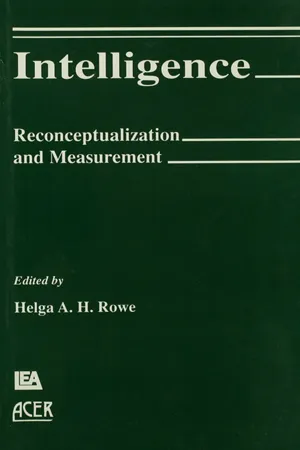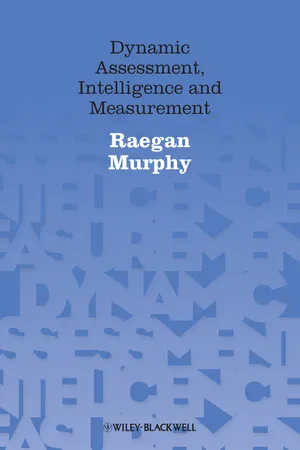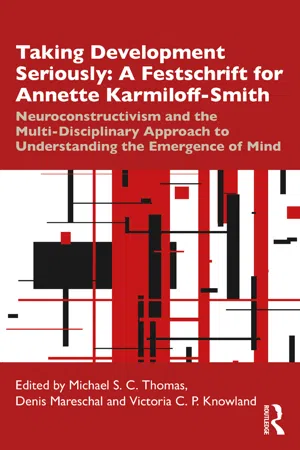Dynamics of Intelligence
Dynamics of intelligence refers to the ever-changing nature of cognitive abilities and the factors that influence them. This concept encompasses the interplay between genetic and environmental influences on intelligence, as well as the potential for intelligence to develop and change over time. Understanding the dynamics of intelligence is crucial for researchers and practitioners in the field of psychology to comprehend the complexity of cognitive functioning.
5 Key excerpts on "Dynamics of Intelligence"
- eBook - ePub
Intelligence
Reconceptualization and Measurement
- Helga A.H. Rowe, Helga A.H. Rowe(Authors)
- 2013(Publication Date)
- Psychology Press(Publisher)
...As we have indicated previously (Pellegrino & Goldman, 1985) the assumption that intelligence can change shifts the focal issues away from the psychometric properties of intelligence tests and conditions that affect performance on those tests. Rather, issues associated with the ability to learn and the conditions that optimize learning take on central importance. Critical to efforts to examine the ability to learn are determinations of the entry level skills of the learner and the development of diagnostic rather than predictive tests. Thus, both the sociocultural and the cognitive information processing perspectives on development lead to the rejection of assessments of intellectual functioning that deal only with the products of learning but do not address issues of teachability and potentially effective intervention techniques. In place of such “static” assessment, there has been renewed interest in dynamic assessment of intellectual skills and intervention efforts that might provide information regarding individuals’ learning potential and responsiveness to instruction (e. g., Brown & Ferrara, 1985; Campione & Brown, 1988, 1990; Feuerstein, Rand, Jensen, Kaniel, & Tzuriel, 1988; Ferrara, 1987a, b; Vye, Burns, Delclos, & Bransford, 1988). As Lidz (1988) has cogently pointed out, measuring intelligence as the ability to learn or as the ability to benefit from practice is not a novel interpretation of intelligence, having been popular in the 1920s. With respect to understanding development and mechanisms of developmental change in intellectual functioning, the cognitive information processing and sociocultural perspectives generate somewhat different empirical emphases. The cognitive information processing perspective emphasizes detailed analyses of the macro and microstructure of cognition as manifest in specific tasks and content. The tasks and content include those found on tests of intelligence and academic achievement as well as in the classroom...
- eBook - ePub
- Raegan Murphy(Author)
- 2012(Publication Date)
- Wiley(Publisher)
...Key aspects of intelligence research were looked at and included aspects such as g, adaptability, lay and expert opinions of intelligence, approaches to the study of intelligence and various traditions of explanation. Dynamic assessment and intelligence were finally brought together to position one within the other and to help identify the various concerns within the movement. Dynamic assessment can, it is supposed, be construed as being entangled in terms of basic philosophies and methodologies. The chapter concluded with an overview of what is commonly referred to as the quantitative imperative and sets the tone for the discussion in chapter 3 dealing with measurement as an enterprise within psychology. A Glance at the Rest of the Book Chapter 2 entreats the reader to study carefully the philosophical underpinnings of psychological science as it is encompassed within social science research and the broader field of scientific knowledge acquisition. Also included is an introduction to and discussion of the meta-theoretical framework utilized, according to which theories and models of dynamic assessment within intelligence are to be studied. This chapter also discusses the influence of historicity, socio-politics, concepts, theories, schemata and models within social science research. Chapter 3 addresses the fundamentals of psychological assessment, includes sections on the mathematical, statistical and measurement foundations and concludes with how these foundations form and are informed by intelligence assessment – specifically dynamic assessment – and details the manner in which these concerns fit into the larger attenuated Madsenian framework. Chapter 4 revolves around the comparison of dynamic assessment theories and models within intelligence assessment and seeks to explore the developed meta-theoretical framework for dynamic assessment and intelligence. Chapter 5 concludes with summaries, conclusions and recommendations....
- eBook - ePub
- Robert J. Sternberg, Robert J. Sternberg(Authors)
- 2014(Publication Date)
- Psychology Press(Publisher)
...3 Dynamics of Skill Acquisition: Building a Bridge Between Intelligence and Motivation Ruth Kanfer Phillip L. Ackerman University of Minnesota OVERVIEW At various points during this century, and especially in recent years, it has been popular to claim that the IQ operationalization of the intelligence construct is an overly restrictive one (e.g., see Gardner, 1983; Guilford, 1967; Sternberg, 1985). Numerous researchers have sought to expand the construct of intelligence beyond the verbal knowledge, reasoning, mathematical, and spatial ability domains. In general, these researchers have implicitly maintained that a broader definition of intelligence will yield a psychologically richer basis for theorizing about individual differences in person-environment interactions. The approach to be described in this chapter takes an altogether different tack for furthering the study of intelligence. Rather than seeking to expand the taxonomic basis of intellectual abilities, our aim is to integrate a more traditional ability approach with another critical family of theories, namely, one of motivational determinants of performance, By presenting a sketch of a unified approach to ability and motivation phenomena, we hope to establish a framework that will more firmly ground intelligence theory in a larger context and will continue to challenge ability theorists toward broader notions of intelligence. That is, we feel that consideration of interactions among the three key psychological classes of individual differences, (a) cognitive (i.e., intellectual), (b) conative (i.e., motivational), and (c) affective, are integral for understanding the development and expression of intelligence. The forum for this discussion concerns individual differences in skill acquisition...
- Jessica Kuper, Jessica Kuper(Authors)
- 2015(Publication Date)
- Routledge(Publisher)
...Intellectual development has been studied from both quantitative and qualitative angles. The main instrument of quantitative study has been the IQ test, and a veritable industry has grown up around the refinement of such tests and the question of whether performance on them reflects innate endowment or environmental influences. Indeed, the construction of norms of all kinds has been a major activity of developmental psychology, through which it helps to propagate social values and regulate individual conduct. It is in the qualitative study of cognitive development that most of developmental psychology's original contributions to the rest of psychology are to be found. Within mainstream American and British psychology, the behaviourist emphasis on studying observable stimuli and responses discouraged interest in mental processes for several decades, but a major breach in this position was made in 1959 by Chomsky, who demonstrated that the child's ability to learn language could not possibly be explained on stimulus-response principles. With mental activities once again accepted as a proper object of study, Piaget's ‘cognitive-developmental’ approach to the child's active structuring of the world – developed several decades earlier – was widely adopted, along with his more sensitive and detailed methods of observation. The particular theories of both Chomsky and Piaget have been heavily criticized, but their emphasis on the distinctively human activities of language and thought – to which behaviourism could not do justice – helped to displace mechanistic and biologistic thinking from psychology. Since the 1960s, the study of linguistic and cognitive development has become one of the most fertile areas of psychology...
- eBook - ePub
Taking Development Seriously A Festschrift for Annette Karmiloff-Smith
Neuroconstructivism and the multi-disciplinary approach to understanding the emergence of mind
- Michael S. C. Thomas, Denis Mareschal, Victoria Knowland, Michael S. C. Thomas, Denis Mareschal, Victoria Knowland(Authors)
- 2021(Publication Date)
- Routledge(Publisher)
...Importantly, most current theories of intelligence happen to be theories of adult intelligence. That is, they attempt to provide an explanation for the differences seen in abilities between individuals, but they neglect to provide an account of where the processes responsible for differences come from, or how these processes are shaped by development. To this end, we suggest a codicil to Annette’s aphorism: To understand intelligence, it is necessary to take development seriously. Before we describe our attempt to take development seriously in the study of intelligence, we shall address another question that the reader may have in mind – why study intelligence in any case ? Why intelligence? Our answer to this is that questions concerning intelligence are fundamental to an understanding of the mind. Consider, what exactly is intelligence? What property differentiates a more intelligent person from a less intelligent person? Where does this property come from? And, what influences, or modulates it over time? We find such questions inherently interesting, and the answers have potentially far-reaching consequences. Admittedly, not everyone shares our enthusiasm for the topic. Indeed, within academic psychology the subject of intelligence appears to have been somewhat unpopular – perhaps not surprising when the research has often been marred by linking contentious scientific claims about intelligence, race, social class and genetics with socio-political outcomes (e.g., Jensen, 1998, 2006 ; Rushton, Jensen, Philippe Rushton, & Jensen, 2003 ; for discussion, see Anderson, 2007). Though certainly a troubled history, the study of intelligence has nevertheless revealed important empirical facts that beg the development of better theories...




